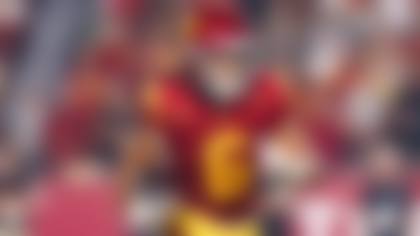Franchise quarterback is the most elusive and essential need in all of pro football. NFL teams are desperate to find one, willing to part with valuable draft capital or invest millions in the hopes of adding this critical piece to the roster. But too often in their pursuit of a top-tier passer, organizations mistake adequate for exceptional, fooling themselves into thinking a middle-of-the-road passer is worthy of being the face of the franchise.
So what is a franchise quarterback, and which teams have had the best run of them? To answer these two questions, we established four simple criteria and applied them to every quarterback since the common-era draft began in 1967, when the AFL and NFL first began drafting together. To qualify, a player must have 48 starts with one team and meet two of the following three requirements:
1) Winning regular-season record.
2) Minimum passer rating of 75.0.
3) At least one Pro Bowl selection.
None of these provisions alone paint a perfect picture, but together they help to illustrate sustained production at an above-average level. And at the core of what all fans crave from their quarterback is someone who consistently keeps the team competitive and provides a realistic shot at the playoffs. Everything else is gravy.
For every franchise passer teams get right, there are countless others they miss on entirely. That's why we've also identified each organization's biggest QB misstep. Perspective is important, and we should always remember just how bad things can get when dependable quarterback play disappears.
Because we only considered a player's performance from 1967 onward, some notable passers, such as Bart Starr and Don Meredith, aren't included, while others, like Johnny Unitas, only have post-'66 production factored into their franchise QB eligibility.
I'm sure you'll agree with all of the choices below, so I don't expect any disparaging tweets. Next up: AFC North.
NOTE: Pro Bowl totals below include AFL All-Star Game selections, while Super Bowl ring totals only include titles won as the team's starting quarterback. The names of franchise QBs who are also their team's current starter are in bold.
Baltimore Ravens
Who qualifies for the Ravens?
-- Joe Flacco (2008-2018): 163 games | 96-67 | 0 Pro Bowls | 84.1 passer rating | 1 SB ring
THE Franchise QB: Joe Flacco
Flacco holds every major Ravens passing record, throwing for four times as many touchdowns (212) as the next closest quarterback (Vinny Testaverde) in team history. Flacco's 11 touchdowns and zero interceptions in the 2012 playoffs en route to a Super Bowl win will forever be etched in team history. But so will his steady decline that followed. After the Ravens traded up to take Lamar Jackson in the first round of the 2018 NFL Draft, Flacco was on borrowed time. A hip injury midway through the 2018 campaign opened the door for Jackson, who ran with his opportunity (literally), guiding the Ravens back to the playoffs after a three-year absence. Will Jackson develop into the Ravens' second ever franchise quarterback? Time will tell. For now, Flacco's still the best the Ravens have known under center.
Biggest QB misstep: Kyle Boller
Drafted 19th overall in 2003, Boller was supposed to be the team's answer to its constant QB woes. But the former Cal product never developed into the franchise passer Baltimore hoped, finishing his Ravens career with 45 touchdown passes and 44 picks in 42 starts. The Ravens' best record (13-3) during Boller's five-year tenure came in 2006, when Steve McNair started all 16 games for Baltimore.
Longest QB drought: 1996-2007
It's an understatement to say the Ravens have been a defense-first franchise during their 24-year history. Case in point: The team went 12-4 and won a Super Bowl with Tony Banks and Trent Dilfer combining for 20 touchdown passes, 19 interceptions and a sub-75.0 passer rating. That the Ravens managed double-digit wins in years when Elvis Grbac and Boller were the team's leading passers, is a testament to the greatness of Ray Lewis, Ed Reed and Terrell Suggs, et al.
Cincinnati Bengals
Who qualifies for the Bengals?
-- Andy Dalton (2011-present): 120 starts | 68-50-2 | 3 Pro Bowls | 88.8 passer rating
-- Carson Palmer (2003-10): 97 starts | 46-51 | 2 Pro Bowls | 86.9 passer rating
-- Jeff Blake (1994-99): 66 starts | 25-41 | 1 Pro Bowl | 79.3 passer rating
-- Boomer Esiason (1984-1992): 123 starts | 62-61 | 4 Pro Bowls | 83.1 passer rating | 1 MVP
-- Ken Anderson (1971-1986): 172 starts | 91-81 | 4 Pro Bowls | 81.9 passer rating | 1 MVP
THE Franchise QB: Ken Anderson
Anderson started 49 more games than the next closest Bengals QB and owns basically every franchise passing record; though, Dalton is just 10 TD throws and 4,739 passing yards away from taking two of those marks. Different era, different game -- I know. Both Anderson and Boomer took the Bengals to the Super Bowl (and lost), but Anderson had twice as many 10-win seasons as Esiason and gets extra points for playing his entire 16-year career with Cincinnati.
Biggest QB misstep: Akili Smith
The Bengals hadn't had a winning record for eight consecutive seasons when they drafted Akili Smith No. 3 overall in 1999. The dynamic playmaker out of Oregon was supposed to change the fortunes of the franchise, but instead went 3-14 as a starter over four seasons. The Bengals would struggle so mightily that they turned to Jon Kitna -- he of the 50-74 career record -- just two years after drafting Smith. I guess the silver lining is that Smith and Kitna combined for so few wins that the Bengals earned the No. 1 pick and the right to draft Carson Palmer in 2003.
Longest QB drought: 1999-2003
The organization has had a remarkable level of consistency at the position throughout its history -- for better or worse -- with the most disruption occurring in the post-Esiason, pre-Palmer years. Blake's tenure covers part of that span, and while he (barely) meets the criteria of a franchise passer as outlined above, he did win more games in his 66 starts for Cincinnati than Gus Frerotte (0-3), Neil O'Donnell (2-9), Smith (3-14) and Kitna (18-28) won in their combined 77.
Cleveland Browns
THE Franchise QB: Bernie Kosar
Kosar doesn't hold the Browns' all-time records in passing yards, touchdowns or games started by a quarterback. Brian Sipe is the leader in those categories among the qualifiers for this exercise. But when I asked NFL.com Editor (and Unsung Hero) Tom Blair, a renowned Browns fan, which QB best defines his favorite sports franchise, he didn't hesitate in throwing his support behind Kosar. A first-round pick pick in the 1985 Supplemental Draft, Kosar guided Cleveland to three of the franchise's five total playoff wins since 1969. Playoff wins mean extra to a franchise that hasn't experienced postseason football since 2002. This success-starved fan base already has visions of their current QB becoming the franchise's best of all time, especially after he ended the team's 19-game winless streak. If Baker Mayfield snaps the Browns' 16-year playoff drought, too, his rise to the top spot won't be a matter of if, but when.
Biggest QB misstep: Brandon Weeden
For the record, I take no enjoyment in this blurb. But facts are facts, and one of the most damning for Cleveland is that the team has drafted four quarterbacks in the first round (not including Baker) since the franchise returned in 1999, who combined for 32 wins and 67 losses. Tom Brady has lost just 60 regular-season games in his entire career. I went Weeden over Tim Couch, Brady Quinn or Johnny Manziel because the Browns picked Weeden (whom they waived 22 months later) two rounds ahead of two future Super Bowl winners (Russell Wilson and Nick Foles).
Longest QB drought: 1994-present
Last season, Mayfield became the 35th quarterback to start a game for the Browns since 1993. If all goes well in Cleveland, they won't see No. 36 for a long, long time. The turnover at the position has been widely mocked (the list is truly incredible), but if the former Heisman Trophy winner can continue to build on his record-setting rookie campaign and elevate an all-star supporting cast, Browns fans may be the ones laughing for years to come.
Pittsburgh Steelers
Who qualifies for the Steelers?
-- Ben Roethlisberger (2004-present): 214 starts | 144-69-1 | 6 Pro Bowls | 94.2 passer rating | 2 SB rings
-- Kordell Stewart (1995-2002): 80 starts | 46-29 | 1 Pro Bowl | 72.3 passer rating
-- Neil O'Donnell (1991-95): 61 starts | 39-22 | 1 Pro Bowl | 81.8 passer rating
-- Terry Bradshaw (1970-1983): 158 starts | 107-51 | 3 Pro Bowls | 70.9 passer rating | 1 MVP | 4 SB rings
THE Franchise QB: Terry Bradshaw
This was one of the toughest calls in the entire exercise, and I expect to get some heat for it. But when I think of the Steelers' franchise, I think of the '70s teams that won four Super Bowls in six seasons, establishing one of the most dominant dynasties the NFL has ever seen. And although the defense was the driving force leading those squads, Bradshaw and the offense more than did their part, ranking ninth or better in each of those six seasons.
Trying to argue that Bradshaw played the position better than Roethlisberger would be a dumb take and a waste of time. Big Ben has been a top-12 quarterback for much of his career, and his Steelers passing records won't be sniffed for decades (at least). But many of the benefits Bradshaw enjoyed during his career -- and which people often hold against him (world-class defense, Hall of Fame-caliber offensive playmakers, etc.) -- also apply to Roethlisberger. And the edge one would assume Roethlisberger possesses playing in today's pass-happy era doesn't actually hold up so well when you compare the two stars' playoff stats:
Bradshaw: 14-5 | 57.2 comp. % | 8.4 Y/A | 30 TD passes | 26 INTs | 83 passer rating
Roethlisberger: 13-8 | 62.4 comp. % | 7.8 Y/A | 30 TD passes | 24 INTs | 86.5 passer rating
The narrowest of margins separates these two franchise passers, and the scales could certainly sway in Roethlisberger's direction with one wave of a Terrible Towel. But 4 > 2, so Terry wins -- for now.
Biggest QB misstep: Passing on Dan Marino
Coming off a 6-3 record and playoff appearance in the strike-shortened 1982 season, the Steelers had the opportunity to draft a successor to the 34-year-old banged-up Bradshaw. And not just any QB at that, but a future Hall of Famer who grew up in the city and played college ball at Pitt. The Steelers, however, passed on hometown hero Dan Marino with the No. 21 overall pick. (In a tragic turn, the player they did draft, Gabe Rivera, played in just six NFL games before he was paralyzed in a drunken-driving accident.) Sticking with Bradshaw proved to be a major mistake for the franchise, as the Hall of Famer underwent (secret) surgery on his throwing arm that offseason and would make only one start in the '83 season before retiring. The Steelers promoted 1980 first-round pick Mark Malone to QB1 in 1984, but he'd go 21-22 over the next four seasons, while Marino rapidly established himself as one of the league's best passers.
Longest QB drought: 1983-1990
From 1972 to 2018, the Steelers won 26 more games (455) than the next closest team (Patriots) and missed the playoffs just 16 times. Four of those disappointing seasons fell within this seven-year window. During their QB drought, the Steelers turned to Cliff Stoudt, David Woodley, Scott Campbell, Steve Bono, Todd Blackledge, Bubby Brister and Malone, who combined to go 63-64. At one of their lowest periods during the Super Bowl era, the Steelers basically went .500. Their bad is so much better than everyone else's.
Follow Ali Bhanpuri on Twitter @AliBhanpuri.












